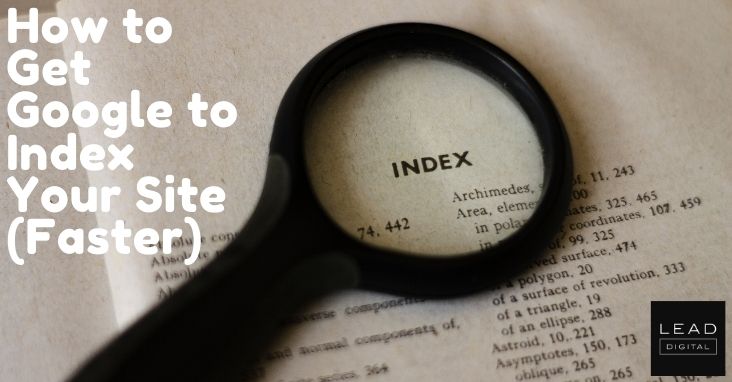
For your landing pages, blogs, homepages, and other online content to show up in Google’s search engine results, you need to ensure your website is indexable. Google Index is basically a database.
When people use the search engine to look for content, Google turns to its index to provide the relevant content. If your page isn’t indexed, it doesn’t exist in Google’s search engine. That’s bad news if you’re hoping to drive organic traffic to your website via organic search.
This guide provides greater detail about indexing and why it’s important. It also explains how you can check to see if your page is indexed, how to fix common technical SEO problems that cause indexing issues, and how to quickly get Google to recrawl index your site if it’s not already indexed.
- What Is Google’s Index?
- Why Is Site Indexing Important?
- How Do I Check If Google Has Indexed My Site?
- How Long Does It Take for Google to Index a Site?
- How Do I Get Google to Index My Site?
- Get More Insights Into Your Site’s SEO
What Is Google’s Index?
Google’s index is simply a list of all the webpages that the search engine knows about. If Google doesn’t index your website, your site won’t appear in Google’s search results.
It would be like if you wrote a book, but no bookstores or libraries stocked that book. Nobody would ever find the book. They might not even know of its existence. And if a reader were looking for that book, they’d have a really hard time finding it.
Why Is Site Indexing Important?
Websites that aren’t indexed are not in Google’s database. The search engine thus can’t present these websites in its search engine results pages (SERPs).
To index websites, Google’s web crawlers (Googlebot) need to “crawl” that website. Learn more about the difference between crawlability versus indexability.
As a refresher, here’s a quick overview of the search engine process:
- Crawling: Search engine bots crawl the website to figure out if it’s worth indexing. Web spiders, or “Googlebot,” are always crawling the web, following links on existing web pages to find new content.
- Indexing: The search engine adds the website to its database (in Google’s case, its “Index”).
- Ranking: The search engine ranks the website in terms of metrics like relevance and user-friendliness.
Indexing just means the site is stored in Google’s databases. It doesn’t mean it will show up at the top of the SERPs. Indexing is controlled by predetermined algorithms, which factor in elements like web user demand and quality checks. You can influence indexing by managing how spiders discover your online content.
Get a Technical SEO Audit
with Semrush Site AuditTry for Free
How Do I Check If Google Has Indexed My Site?
There’s no doubt that you want your website to be indexed — but how can you know if it is or not? Luckily, the search engine giant makes it pretty easy to find out where you stand via site search. Here’s how to check:
- Go to Google’s search engine.
- In the Google search bar, type in “site:example.com.”
- When you look under the search bar, you’ll see the Google results categories “All,” “Images,” “News,” etc. Right underneath this, you’ll see an estimate of how many of your pages Google has indexed.
- If zero results show up, the page isn’t indexed.
Alternatively, you can use Google Search Console to check if your page is indexed. It’s free to set up an account. Here’s how to get the information you want:
- Log into Google Search Console.
- Click on “Index.”
- Click on “Coverage.”
- You’ll see the number of valid pages indexed.
- If the number of valid pages is zero, Google hasn’t indexed your page.
You can also use the Search Console to check whether specific pages are indexed. Just paste the URL into the URL Inspection Tool. If the page is indexed, you’ll receive the message “URL is on Google.”
How Long Does It Take for Google to Index a Site?
It can take Google anywhere from a few days to a few weeks to index a site. This can be frustrating if you’ve just launched a page only to discover that it isn’t indexed. How is anybody supposed to discover your beautiful new webpage via Google? Luckily, there are steps you can take for more efficient indexing. Below, we explain what you can do to speed up the process.
How Do I Get Google to Index My Site?
The easiest way to get your site indexed is to request indexing through Google Search Console. To do this, go to Google Search Console’s URL Inspection Tool. Paste the URL you want to be indexed into the search bar and wait for Google to check the URL. If the URL isn’t indexed, click the “Request Indexing” button.
Note: Google had temporarily disabled the request indexing tool in October 2020. However, it was just restored in Search Console!
However, Google indexing takes time. As mentioned, if your site is new, it won’t be indexed overnight. Additionally, if your site isn’t properly set up to accommodate Googlebot’s crawling, there’s a chance it won’t get indexed at all.
Whether you’re a site owner or an online marketer, you want your site efficiently indexed. Here’s how to make that happen. – Read more



